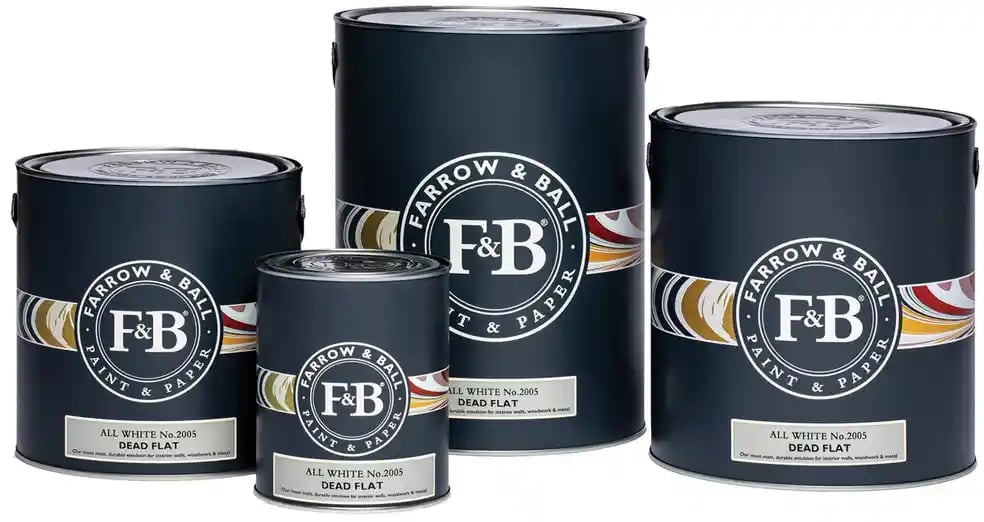(303) 999-8864
Is Farrow and Ball Paint Worth the Hype?
DAECO Painting reviews Farrow and Ball paint in Denver, offering expert tips on durability, color, finishes, and high-end interior painting for homes. Learn more.
INTERIORSPRODUCT REVIEWFARROW & BALL PAINTS
DAECO PAINTING
1/18/20264 min read


The Paint Dilemma Every Homeowner Faces
Quick Verdict
Yes—Farrow & Ball is worth it if you value distinctive color depth, designer-driven finishes, and are painting smaller, high-impact interior spaces.
No—it’s not the best choice if you need maximum durability for large, high-traffic areas or are working within a tight budget.
That nuance matters—especially in Denver homes.
Why Designers (and Some Painters) Love Farrow & Ball
Farrow & Ball isn’t just premium paint—it’s a design-forward coating system built around pigment quality, finish character, and how color reacts to light.
Unmatched Color Character
Shades like Hague Blue, Railings, and Setting Plaster are known for their layered, atmospheric look. Farrow & Ball uses a high pigment load and traditional color formulations, which create depth many mass-market paints don’t fully replicate—even when color-matched.
This is why designers gravitate toward it: the colors shift subtly throughout the day, rather than staying flat.
Signature Finishes
Estate Emulsion: Ultra-flat, chalky, and elegant. Exceptional at hiding surface imperfections, but designed for low-traffic spaces.
Modern Emulsion / Modern Eggshell: More washable and scuff-resistant, making them better suited for kitchens, baths, and family areas.
Estate Emulsion is about visual softness—not durability.
Low-VOC, Eco-Conscious Formula
Farrow & Ball’s water-based, low-VOC formulas appeal to homeowners prioritizing indoor air quality—especially relevant in tightly sealed Denver homes during winter months.
How Durable Is Farrow & Ball—Really?
This is where expectations need to be realistic. Farrow & Ball delivers stunning color and designer finishes, but performance varies by line:
Estate Emulsion is wipeable, not truly washable. It performs best in bedrooms, dining rooms, offices, and other low-traffic areas.
Modern Emulsion / Eggshell is more durable and holds up well to routine cleaning, making it suitable for kitchens, bathrooms, and other moderately active spaces.
In practice, many professionals find that other premium lines may outperform Farrow & Ball in pure durability:
Sherwin-Williams Emerald and Benjamin Moore Regal Select offer strong washability and scuff resistance.
Fine Paints of Europe (FPE) is a European luxury option with exceptionally hard, long-lasting finishes—particularly in high-traffic or high-abrasion areas—though it comes at a premium cost.
That said, none of these alternatives fully replicate the color depth, texture, and designer character that Farrow & Ball provides. At DAECO, we choose the right product based on room function, exposure, and aesthetic goals, treating Farrow & Ball as a strategic, high-impact solution, rather than a universal interior paint.
At DAECO, we treat Farrow & Ball as a design-specific solution, not a universal interior paint.
How Much Does Farrow & Ball Cost in Denver?
Pricing varies by finish and retailer, but most Denver homeowners should expect:
The table’s numbers align well with 2026 U.S. retail pricing trends for these premium paints, though exact costs vary by retailer, location (e.g., Denver)
Farrow & Ball
Price: ~$125 – $158+ per gallon
Notes: Ultra-premium pigment load. Best for depth of color, not high durability.View: Farrow&Ball
Sherwin-Williams
~$85–$110+ matches Emerald/Duration retail (videos confirm ~$110–$120 retail, with pro discounts lowering it); Emerald Designer Edition hits ~$120. Durability emphasis is accurate. View: Sherwin Williams
Benjamin Moore
Price: ~$75 – $105+ per gallon
Notes: Aura offers similar color technology; Regal Select is the industry workhorse. Benjamin Moore
Fine Paints of Europe
Price: ~$110 – $145+ per gallon
Notes: Dutch luxury. Exceptionally hard finishes (Hollandlac/Eco). Requires high labor skill to apply. View: Find Paints Of Europe
Coverage Note: Two coats typically provide full coverage on properly primed surfaces—similar to other premium paints. At this level, surface prep matters more than the brand.
How Farrow & Ball Performs in Denver Homes
Denver’s environment plays a bigger role than most homeowners expect.
Dry air can increase the risk of flashing if surfaces aren’t properly primed.
High UV exposure through large windows can affect deeper, saturated hues over time.
Rapid seasonal changes make finish selection more important than color alone.
In real-world applications, we often recommend:
Deeper hues in lower-light rooms
Modern Emulsion over Estate Emulsion in active family homes
Extra attention to prep, primer choice, and application technique
Example: In a recent Wash Park powder room, we used Hague Blue in Modern Eggshell to balance dramatic depth with frequent cleaning needs.
Application Tips (From the Field)
Farrow & Ball rewards good technique—and exposes shortcuts.
Use high-quality microfiber rollers and synthetic brushes
Apply two thin coats, allowing full dry time
Avoid overworking the paint; it flows differently than thicker contractor-grade products
Prime properly—Farrow & Ball performs best over quality primer (or their own system)
This is where experienced crews make the difference.
Common Myths—Debunked
“You can’t touch it up.”
You can—especially with Estate Emulsion—but only after full curing (about two weeks) and careful feathering.
“It’s too hard to apply.”
It’s not difficult, just unforgiving. Technique matters more than speed.
Where to Buy Farrow & Ball in Denver
Availability is more limited than big-box brands.
Lovejoy & Company (Denver) — boutique design retailer familiar with Farrow & Ball finishes
Online ordering direct from Farrow & Ball (plan ahead for delivery)
Stock can vary, so early ordering is smart—especially for full-home projects.
So…Is Farrow & Ball Worth It?
Best for:
Design-driven homeowners
Small, high-impact spaces (powder rooms, dining rooms, accent walls)
Clients who prioritize finish character over cost per gallon
Not ideal for:
Large, budget-sensitive projects
High-traffic family areas unless using Modern finishes
Rental properties or frequent repaint cycles
The DAECO Take:
We use Farrow & Ball strategically—where its strengths shine and its limitations won’t become a liability. When applied thoughtfully, it delivers results few paints can match.
A Final Word on Color-Matching
Color-matching Farrow & Ball shades into other brands can reduce cost, but the pigment load and finish character won’t be identical. We view this as a calculated compromise for secondary spaces—not a true substitute.
Thinking about Farrow & Ball for your Denver home?
At DAECO Painting, we’ve completed numerous Farrow & Ball projects across Wash Park, Cherry Creek, and other Mile High City neighborhoods. If you want a flawless, design-forward finish and expert guidance on which colors and finishes work best for your space, we’d love to talk.
Contact DAECO Painting →
303-999-8864
DAECO PAINTING COMPANY© 2026. All rights reserved.
Service Solutions
Paint Options


Local Service Locations
DAECO Painting, established in 2003, is a trusted and recognized high-end paint and decorating contractor. We specialize in custom luxury residential painting projects, including repaints, historical restorations, and new construction homes and lofts. Our expertise lies in delivering flawless Level 5 finish results, with a primary focus on high-end fine finish repaints and new custom home builds and remodels. We cater to all residential clients, from the average consumer to the elite, and our commitment to quality and service remains consistent across every project.
Vail, CO
Aspen, CO
Winter Park, CO
Breckenridge, CO
